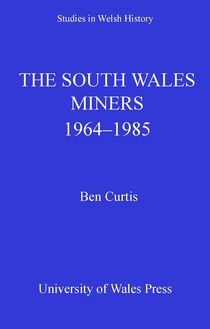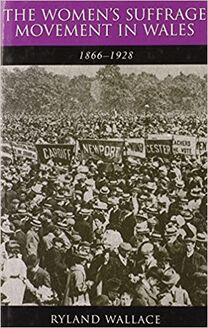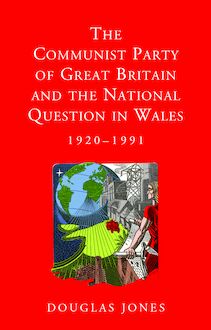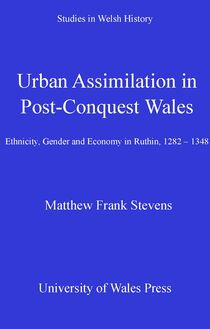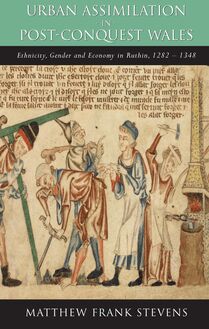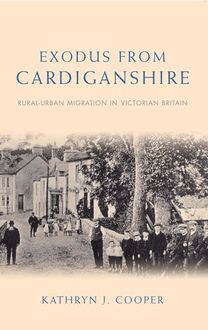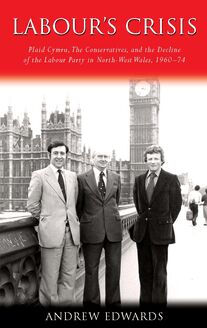-
 Univers
Univers
-
 Ebooks
Ebooks
-
 Livres audio
Livres audio
-
 Presse
Presse
-
 Podcasts
Podcasts
-
 BD
BD
-
 Documents
Documents
-
- Cours
- Révisions
- Ressources pédagogiques
- Sciences de l’éducation
- Manuels scolaires
- Langues
- Travaux de classe
- Annales de BEP
- Etudes supérieures
- Maternelle et primaire
- Fiches de lecture
- Orientation scolaire
- Méthodologie
- Corrigés de devoir
- Annales d’examens et concours
- Annales du bac
- Annales du brevet
- Rapports de stage
La lecture à portée de main
298 pages
English
Découvre YouScribe en t'inscrivant gratuitement
Je m'inscrisDécouvre YouScribe en t'inscrivant gratuitement
Je m'inscris
Obtenez un accès à la bibliothèque pour le consulter en ligne
En savoir plus
En savoir plus
298 pages
English
Obtenez un accès à la bibliothèque pour le consulter en ligne
En savoir plus
En savoir plus

Description
This book uses, principally but not only, a case study of the Denbighshire town of Ruthin to discuss both the significance of Englishness versus Welshness and of gender distinctions in the network of small Anglo-Welsh urban centres which emerged in north Wales following the English conquest of 1282. It carefully constructs an image of the way in which townspeople's everyday lives were influenced by their ethnic background, gender, wealth and social status. In this manner it explores and explains the motivations of English and welsh townspeople to work together in the mutual pursuit of prosperity and social stability.
Sujets
Informations
| Publié par | University of Wales Press |
| Date de parution | 30 mars 2010 |
| Nombre de lectures | 0 |
| EAN13 | 9780708322505 |
| Langue | English |
| Poids de l'ouvrage | 1 Mo |
Informations légales : prix de location à la page 0,1500€. Cette information est donnée uniquement à titre indicatif conformément à la législation en vigueur.
Extrait
Studies in Welsh History
Urban Assimilation in Post-Conquest Wales
Ethnicity, Gender and Economy in Ruthin, 1282 – 1348
Matthew Frank Stevens
University of Wales Press
STUDIES IN WELSH HISTORY
Series editors RALPH A. GRIFFITHS CHRIS WILLIAMS ERYN M. WHITE
2
9
URBAN ASSIMILATION IN POST-CONQUEST WALES
URBAN ASSIMILATION IN POST-CONQUEST WALES
ETHNICITY, GENDER AND ECONOMY IN RUTHIN, 1282–1348
by MATTHEW FRANK STEVENS
Published on behalf of the University of Wales
CARDIFF UNIVERSITY OF WALES PRESS 2010
© Matthew Frank Stevens, 2010
All rights reserved. No part of this book may be reproduced in any material form (including photocopying or storing it in any medium by electronic means and whether or not transiently or incidentally to some other use of this publication) without the written permis-sion of the copyright owner except in accordance with the provisions of the Copyright, Designs and Patents Act 1988 or under the terms of a licence issued by the Copyright Licensing Agency Ltd, Saffron House, 6–10 Kirby Street, London, EC1N 8TS. Applications for the copyright owner’s written permission to reproduce any part of this publication should be addressed to The University of Wales Press, 10 Columbus Walk, Brigantine Place, Cardiff, CF10 4UP.
www.uwp.co.uk
British Library Cataloguing-in-Publication Data. A catalogue record for this book is available from the British Library.
ISBN 978-0-7083-2249-9 e-ISBN 978-0-7083-2250-5
The right of Matthew Frank Stevens to be identified as author of this work has been asserted by him in accordance with Sections 77, 78 and 79 of the Copyright, Designs and Patents Act 1988.
Printed by CPI Antony Rowe, Chippenham, Wiltshire
SERIES EDITORS’ FOREWORD
Since the foundation of the series in 1977, the study of Wales’s history has attracted growing attention among historians internationally and continues to enjoy a vigorous popularity. Not only are approaches, both traditional and new, to the study of history in general being successfully applied in a Welsh context, but Wales’s historical experience is increas-ingly appreciated by writers on British, European and world history. These advances have been especially marked in the university institutions in Wales itself. In order to make more widely available the conclusions of original research, much of it of limited accessibility in post-graduate dissertations and theses, in 1977 the History and Law Committee of the Board of Celtic Studies inaugurated this series of monographs,Studies in Welsh History.It was antici-pated that many of the volumes would originate in research conducted in the University of Wales or under the auspices of the Board of Celtic Studies, and so it proved. Although the Board of Celtic Studies no longer exists, the University of Wales continues to sponsor the series. It seeks to publish significant contributions made by researchers in Wales and elsewhere. Its primary aim is to serve historical scholarship and to encourage the study of Welsh history.
Map 1. The Marcher lordships of north-east Wales in the early fourteenth century
ACKNOWLEDGEMENTS
This book has been a very long time in the making. It began its life as my University of Wales, Aberystwyth, Ph.D. thesis, researched and written between 2001 and 2005 under the supervision of Professor Phillipp R. Schofield, whose encour-agement and genuine interest in my research have profoundly shaped my desire to discover the ordinary lives of the peoples of medieval Wales and England. The core of the text presented here remains that of my Ph.D. thesis, and so the acknowledgements included at the front of that docu-ment have been reproduced below. Additionally, I must acknowledge the support of those who helped me along the sometimes arduous path which has transformed my thesis, through several rewrites and the addition of much new research, into the book presented here – which nonetheless still bears the hallmarks of a student learning to write history. These include the Economic History Society, without whose generous financial support I would never have got underway, everyone at the University of Oxford who made me feel so welcome during my time there, and the very good friends I have been fortunate to know since moving to the city and University of London, where I have been kindly employed by the Centre for Metropolitan History. In particular, I must thank Mark Merry for his help with the maps, Guy Geltner and Hannes Kleineke for their comments on parts or all of early draft manuscripts and, above all, Ralph Griffiths who so generously offered meticulous and invaluable advice on each draft of this book, and who has done so much to make my prose more intelligible. All remaining mistakes are, of course, my own. London
March 2009
PH.D. ACKNOWLEDGEMENTS
Where can one begin in acknowledging his debts to all those who have offered support and guidance in a project which has taken years to complete? Most immediate is the huge debt I owe to my supervisor, Professor Phillipp Schofield of the University of Wales, Aberystwyth, who has been both knowledgeable and understanding throughout, having a good sense of humour and a great deal of patience. Similarly patient and helpful has been Sarah Powis, whose efforts to help me resolve countless issues of grammar and spelling have been a blessing to me. More broadly, I need to thank both my American friends (most particularly Warren Love, Matthew Bernosky, Jason Msadoques and Howard Simmerman, whose campaigns and adventures have always inspired me) and my closest British friends (Jamie Tedford, Richard Jones and Richard Cordle, among many others) who have kept me sane and made me feel welcome over the last eight years. Likewise, I have always appreciated the support given to me by Patricia Henninger, who shares my interest in places abroad. Lastly and most importantly, I am grateful for the unflagging love and guidance of my mother and father, the latter of whose advice – ‘whatever makes you happy son’ – is the most straightforward and valuable I have ever received (and by the way,thismakes me happy). Aberystwyth
-
 Univers
Univers
-
 Ebooks
Ebooks
-
 Livres audio
Livres audio
-
 Presse
Presse
-
 Podcasts
Podcasts
-
 BD
BD
-
 Documents
Documents
-
Jeunesse
-
Littérature
-
Ressources professionnelles
-
Santé et bien-être
-
Savoirs
-
Education
-
Loisirs et hobbies
-
Art, musique et cinéma
-
Actualité et débat de société
-
Jeunesse
-
Littérature
-
Ressources professionnelles
-
Santé et bien-être
-
Savoirs
-
Education
-
Loisirs et hobbies
-
Art, musique et cinéma
-
Actualité et débat de société
-
Actualités
-
Lifestyle
-
Presse jeunesse
-
Presse professionnelle
-
Pratique
-
Presse sportive
-
Presse internationale
-
Culture & Médias
-
Action et Aventures
-
Science-fiction et Fantasy
-
Société
-
Jeunesse
-
Littérature
-
Ressources professionnelles
-
Santé et bien-être
-
Savoirs
-
Education
-
Loisirs et hobbies
-
Art, musique et cinéma
-
Actualité et débat de société
- Cours
- Révisions
- Ressources pédagogiques
- Sciences de l’éducation
- Manuels scolaires
- Langues
- Travaux de classe
- Annales de BEP
- Etudes supérieures
- Maternelle et primaire
- Fiches de lecture
- Orientation scolaire
- Méthodologie
- Corrigés de devoir
- Annales d’examens et concours
- Annales du bac
- Annales du brevet
- Rapports de stage
Signaler un problème
YouScribe
Le catalogue
Le service
© 2010-2024 YouScribe
